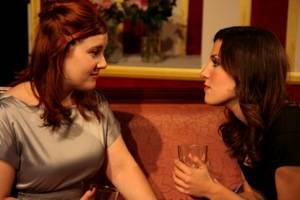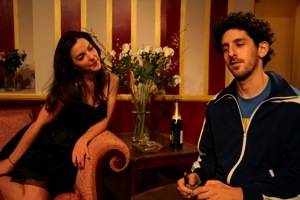
The night before bride-to-be Becky’s wedding, her maid of honor Regan arrives
at Becky’s hotel suite accompanied by two young women, neither of whom is
particularly close to Becky. In fact, Regan tells Katie and Gena, “Becky has no
friends. She has to invite her myspace friends. I’m surprised she didn’t post a
bulletin.” Rather harsh words to come from Becky’s maid of honor, but that’s
just the start of an often very funny, and sometimes quite shocking glimpse into
the ugliness that can hide behind pretty faces.
The play is Bachelorette, the second in Leslye Headland’s 7 Deadly Sins series
which IAMA Theatre will be debuting over the coming year. Like Cinephelia
before it, Bachelorette gives an insightful glimpse into the lives of
20somethings in the first decade of the 21st century.
Headland has a great ear for the language these young women speak, their
sentences peppered with “dude” and “man.” She also knows their drugs of
choice. Alcohol tops the list, and the three gal pals soon begin chugging
down champagne straight from the bottle (there are 15 of them left chilling in
the bathtub) and snorting cocaine.
The girls drink some more, snort some more, smoke some pot, and next thing
you know, Becky’s wedding gown has somehow ended up getting torn.
That’s when Regan tells Katie and Gena that Becky had specifically asked her
not to invite them up to the hotel suite.
With a friend like Regan, who needs enemies? And if these women don’t seem
to be particularly positive images of the female sex, fret not. Men don’t fare
much better in Headland’s world.
Take Jeff, for example, who exclaims to his buddy Joe after they have joined
the young women in the hotel suite, “We just hit the proverbial jackpot! We are
going to get laid tonight!” Later, when Regan complains that Jeff isn’t telling
her how beautiful she is, he responds, “I like to compliment a woman because
she deserves it, not because she wants to hear it.”
Joe meanwhile has got his sights set on Katie, Gena having split earlier. Of the
three girls, it’s Katie who’s the most into mixing her drugs (booze/pot/blow)
and is experienced enough to know when to vomit, cheerfully announcing “I
feel better now” after doing so, and agreeing with pothead Joe who declares
with a smile, “I don’t think pot is addictive. I think it’s natural.” “Too much” is
not part of Katie’s vocabulary. She likes it when she’s so drunk that she can no
longer bring the bottle to her lips. She even likes blacking out. “It’s like
sleeping,” she tells Joe, “but better.”
It should be clear like now that Leslye Headland is writing about some pretty
complicated, conflicted, and not terribly nice people here. (They make the
movies’ Mean Girls look positively sweet by comparison.) They’re certainly not
people I would want to spend time with under ordinary circumstances, but
from the safety of a theater seat, they are fascinating to observe, even more
so when things reach a crisis level in the third and final scene of the play. That’s
when something not terribly nice happens to Katie, Becky finally shows up (and
isn’t particularly happy about what she finds in her suite), and some pretty ugly
truths are revealed about the beautiful Regan.
Headland’s dialog is sharp, insightful, and often very funny, especially when her
characters are being their nastiest (in both senses of the word). Here are some
choice examples:
About the bride-to-be, whom her “friends” delight in calling “fat”:
“Where is she?”
“Probably eating!”
Gena, talking about being at Becky’s wedding:
“I just want to see this bitch, throw some rice, and get the hell out of here.”
About blow jobs:
Bachelorette # 1: “If you do any more coke,” (big smile) “someone’s dick’ll get
sucked!”
Bachelorette # 2: (With an even bigger smile) “Totally!”
About how much enthusiasm should be put into a b.j.:
“You start with a 10, you’ve got nowhere to go. Give a 6 after a fight, an 8
when he brings you something expensive.”
Under Headland’s direction, the cast of six all do first-rate work. Laila Ayad as
Regan, Melissa Stephens as Gena, and Brandon Scott as Jeff, all create very
real, if not very likeable, characters. Adam Shapiro is particularly good, and
natural, as Joe, most notably in a speech he makes about a friend who died
young and never had to grow up. Louise Munson likewise impresses as party-
girl Katie, a 180 degree turn from her prissy nice girl in Cinephelia. Finally,
Stefanie Black as the late arriving Becky has perhaps the choicest role of all,
bringing power to a climactic scene which allows Black to show Becky’s
strength, and her very own potential for cruelty.
Bachelorette’s design team does excellent work, even while operating on a
budget. Most notably, there’s Whitney Whetstone’s well designed and
executed hotel suite, with its red, white, and gold vertically striped walls, stacks
of wedding gifts, and flowers galore. CJ Longhammer’s lighting, Annie
McVey’s sound design, and the uncredited costumes are also fine.
One of the special treats of this 7-part series of plays is the pleasure in seeing
this young company of actors (who became friends while studying at NYU
Tisch School of the Arts) getting the chance to sink their teeth into these
meaty roles. There’s also the future pleasures of seeing the casts of the first two
productions in upcoming roles as different as Munson’s two have been. Finally,
there’s the anticipation of what the talented Leslye Headland has in store
next. Cinephelia was about lust. Bachelorette’s sin is gluttony. That leaves
five more deadly ones to go! I for one can’t wait!
Working Stage Theatre, 1516 N. Gardner Street, Hollywood.
www.iamatheatre.com
–Steven Stanley
January 27, 2008





 Since 2007, Steven Stanley's StageSceneLA.com has spotlighted the best in Southern California theater via reviews, interviews, and its annual StageSceneLA Scenies.
Since 2007, Steven Stanley's StageSceneLA.com has spotlighted the best in Southern California theater via reviews, interviews, and its annual StageSceneLA Scenies.







 COPYRIGHT 2024 STEVEN STANLEY :: DESIGN BY
COPYRIGHT 2024 STEVEN STANLEY :: DESIGN BY